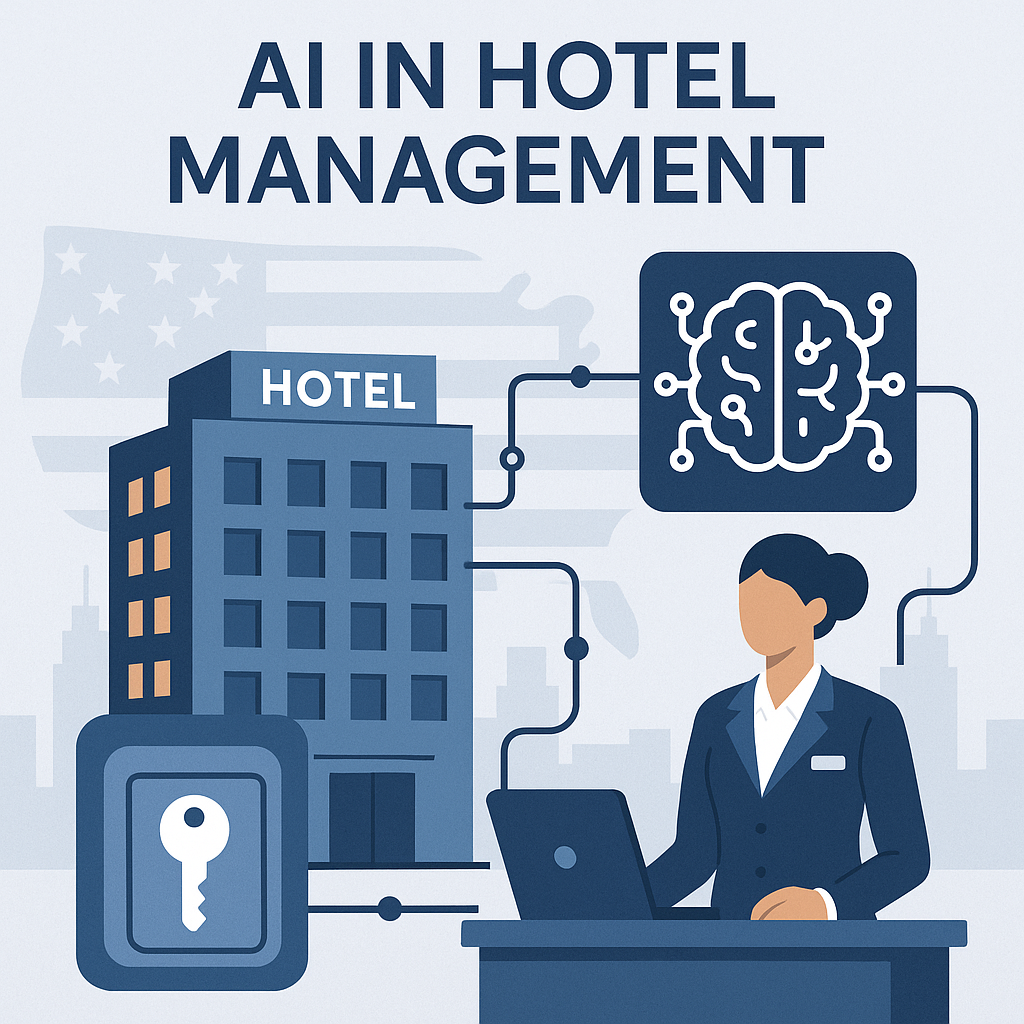
AI in Hotel Management: Transforming the Hospitality Industry in 2025
The hospitality sector is experiencing a technological revolution, and AI in hotel management is at the forefront of this transformation. As we move into 2025, U.S. hotels are leveraging artificial intelligence to enhance guest experiences, streamline operations, and maximize profitability. This comprehensive guide explores how AI is reshaping hotel management, the top AI tools for hotels, and what the future holds for this dynamic industry.
How AI in Hotel Management Is Revolutionizing Hospitality
Artificial intelligence is no longer a futuristic concept—it’s a practical tool that U.S. hotels are using daily. From automating check-ins to personalizing guest services, AI is making hotel management smarter and more efficient.
Key Benefits of AI in Hotel Management 🏨
- Enhanced Guest Experience: AI-driven personalization tailors services to individual preferences.
- Operational Efficiency: Automation reduces manual tasks, saving time and costs.
- Revenue Optimization: Dynamic pricing and demand forecasting maximize profits.
- Improved Security: AI-powered surveillance and fraud detection protect guests and assets.
- Sustainability: Smart energy management systems reduce environmental impact.
TIP: Hotels that adopt AI early often see higher guest satisfaction scores and improved online reviews.
Top 10 AI Applications in Hotel Management for 2025
AI is being used in a variety of innovative ways across the U.S. hotel industry. Here are the top 10 applications making the biggest impact this year:
- AI Chatbots for Guest Communication
- Automated Check-In and Check-Out Kiosks
- Personalized Room Recommendations
- Dynamic Pricing and Revenue Management
- Smart Housekeeping Scheduling
- Voice-Activated Room Controls
- Predictive Maintenance for Facilities
- AI-Powered Marketing Campaigns
- Facial Recognition for Security
- Sentiment Analysis of Guest Reviews
Side-by-Side Comparison Table: Top 10 AI Applications in Hotel Management
| Rank | AI Application | Main Benefit | Example Use Case |
|---|---|---|---|
| 1 | AI Chatbots | 24/7 Guest Support | Answering FAQs instantly |
| 2 | Automated Check-In/Out | Faster Service | Self-service kiosks |
| 3 | Personalized Room Recommendations | Enhanced Experience | Suggesting rooms based on history |
| 4 | Dynamic Pricing | Increased Revenue | Adjusting rates in real-time |
| 5 | Smart Housekeeping Scheduling | Operational Efficiency | Optimizing staff allocation |
| 6 | Voice-Activated Room Controls | Guest Convenience | Controlling lights/temperature |
| 7 | Predictive Maintenance | Cost Savings | Early detection of equipment issues |
| 8 | AI-Powered Marketing | Targeted Promotions | Personalized email offers |
| 9 | Facial Recognition | Improved Security | Keyless room entry |
| 10 | Sentiment Analysis | Reputation Management | Analyzing online reviews |
AI Chatbots in Hotel Management: Enhancing Guest Communication
AI chatbots are revolutionizing how hotels interact with guests. These virtual assistants provide instant responses to inquiries, handle bookings, and even offer local recommendations.
Example: AI Chatbot Code Snippet
import openai
def hotel_chatbot_response(user_input):
prompt = f"Guest: {user_input}\nHotel AI:"
response = openai.Completion.create(
engine="gpt-4",
prompt=prompt,
max_tokens=100
)
return response.choices[0].text.strip()
TIP: Integrating AI chatbots with your hotel’s website and mobile app ensures guests receive support anytime, anywhere.
Dynamic Pricing: Maximizing Revenue with AI in Hotel Management
AI-powered revenue management systems analyze real-time data to adjust room rates dynamically. This ensures hotels remain competitive and profitable, especially during peak seasons or special events.
How Dynamic Pricing Works
- Data Collection: AI gathers data on demand, local events, and competitor pricing.
- Analysis: Machine learning algorithms predict optimal pricing.
- Implementation: Room rates are automatically updated across booking channels.
TIP: Dynamic pricing can increase average daily rates (ADR) by up to 15% for U.S. hotels in 2025.
Smart Housekeeping and Predictive Maintenance: Streamlining Operations
AI optimizes housekeeping schedules based on guest check-ins and check-outs, ensuring rooms are ready when needed. Predictive maintenance uses sensors and AI analytics to detect equipment issues before they become costly problems.
Example: Predictive Maintenance Workflow
def predict_maintenance(sensor_data):
# Simple threshold-based maintenance prediction
if sensor_data['temperature'] > 80 or sensor_data['vibration'] > 5:
return "Maintenance Required"
else:
return "No Action Needed"
TIP: Predictive maintenance reduces unexpected equipment failures and extends asset lifespan.
Personalized Guest Experiences: AI in Hotel Management for Customization
AI analyzes guest preferences, booking history, and feedback to deliver personalized experiences. From room selection to tailored amenities, hotels can exceed guest expectations.
Personalization in Action
- Custom Welcome Messages
- Preferred Room Settings
- Targeted Offers and Upgrades
TIP: Personalization leads to higher guest loyalty and repeat bookings.
AI-Powered Marketing and Sentiment Analysis
AI tools help hotels craft targeted marketing campaigns and analyze guest feedback from online reviews and social media.
Example: Sentiment Analysis Code
from textblob import TextBlob
def analyze_sentiment(review):
analysis = TextBlob(review)
if analysis.sentiment.polarity > 0:
return "Positive"
elif analysis.sentiment.polarity < 0:
return "Negative"
else:
return "Neutral"
TIP: Monitoring sentiment helps hotels address issues quickly and improve their reputation.
The Future of AI in Hotel Management: Trends to Watch in 2025
As AI technology advances, U.S. hotels can expect even more innovative applications:
- Robotic Concierges: Robots assisting guests in lobbies.
- AI-Driven Sustainability Initiatives: Optimizing energy and water usage.
- Seamless Multilingual Support: Real-time translation for global guests.
- Advanced Fraud Detection: Protecting against cyber threats.
TIP: Staying ahead of AI trends ensures your hotel remains competitive in a rapidly evolving market.
Conclusion: Embracing AI in Hotel Management for a Competitive Edge
AI in hotel management is transforming the U.S. hospitality industry in 2025. From AI chatbots and dynamic pricing to predictive maintenance and personalized guest experiences, artificial intelligence offers unparalleled opportunities for hotels to enhance service, streamline operations, and boost profitability. By adopting the latest AI technologies, hotels can deliver exceptional guest experiences, optimize resources, and stay ahead in a competitive market. The future of hotel management is intelligent, efficient, and guest-centric—powered by AI.